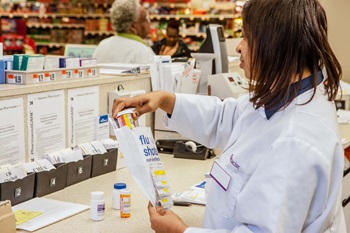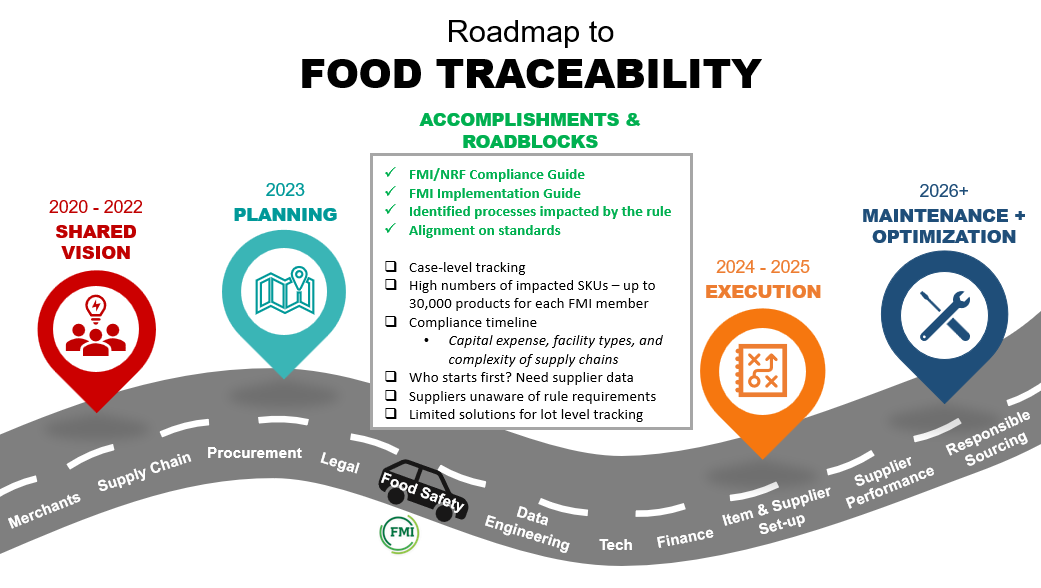By: Peter Matz, Director, Health & Food Policy, Food Marketing Institute
 In May 2018, the Trump Administration released American Patients First, a comprehensive blueprint to reduce prescription drug prices and out-of-pocket costs at the pharmacy counter. The plan advocates for increased transparency throughout the pharmaceutical supply chain, including reforms that would upend the pharmacy benefit manager (PBM) business model, making it harder for PBMs to siphon money away from pharmacies via DIR fees. To that end, the Department of Health & Human Services (HHS) recently released a proposed rule containing a number of positive policy reforms to pharmacy DIR fees. Most importantly, it would require all pharmacy fees to be included at the point of sale of the initial transaction, which would effectively eliminate the retroactive nature of pharmacy DIR fees. Food Marketing Institute (FMI) strongly supports the proposal, and thanks the Administration for this first, but important, step.
In May 2018, the Trump Administration released American Patients First, a comprehensive blueprint to reduce prescription drug prices and out-of-pocket costs at the pharmacy counter. The plan advocates for increased transparency throughout the pharmaceutical supply chain, including reforms that would upend the pharmacy benefit manager (PBM) business model, making it harder for PBMs to siphon money away from pharmacies via DIR fees. To that end, the Department of Health & Human Services (HHS) recently released a proposed rule containing a number of positive policy reforms to pharmacy DIR fees. Most importantly, it would require all pharmacy fees to be included at the point of sale of the initial transaction, which would effectively eliminate the retroactive nature of pharmacy DIR fees. Food Marketing Institute (FMI) strongly supports the proposal, and thanks the Administration for this first, but important, step.
Health and well-being, including pharmacy-specific programs, is of the utmost importance to our industry. Moreover, supermarket pharmacies provide a positive competitive market force in delivering affordable and accessible prescription medicines to consumers and patients. Over the years, however, FMI members have been frustrated by DIR fees, which PBMs have used strategically to recoup funds from pharmacies retroactively, often weeks or even months after prescriptions were filled. These retroactive fees, also commonly referred to as rebates or price concessions, are bad for consumer wallets and pharmacies alike: beneficiaries face higher cost-sharing for drugs, while the reimbursement uncertainty makes it extremely difficult for pharmacies to operate and take care of their patients (e.g. pharmacies often realize long after a prescription is filled that they didn’t even recoup their costs).
According to the federal government, pharmacy DIR fees have grown by more than 45,000 percent between 2010 and 2017! And, in an industry that operates on razor thin profit margins, supermarket pharmacies have virtually no ability to absorb these unexpected costs. Therefore, they are forced to either pass those costs on to consumers in the form of higher prices, or worse, discontinue offering pharmacy services altogether at certain locations.
In January, we submitted comments in response to the aforementioned proposed rule. We expressed support for the proposal – especially the elimination of retroactive pharmacy DIR fees – and respectfully requested the Administration move forward in a timely manner. However, given the significance of this topic to FMI pharmacy members, we also included several cautionary points for consideration, such as the need for increased oversight of pharmaceutical supply chain intermediaries – particularly PBMs.
To that end, we requested that HHS adopt requirements for PBMs to offer pharmacies reasonable and appropriate reimbursement terms for prescription drugs, which at a minimum, cover the cost of procuring drugs and providing other services related to their dispensing. Additionally, we asked the Administration to develop and formalize a standard set of performance metrics with achievable goals tailored to pharmacy type, drug dispensed, and disease state being managed, from which all plans and pharmacies would base their contractual agreements.
As written, the proposed rule demonstrates the Administration’s dedication to providing savings for consumers at the pharmacy counter, as well as needed support to pharmacies and their patients. However, time will tell if/how the rule is finalized, and we will continue advocating for FMI pharmacies in the meantime.
Learn more about DIR Fees and the HHS proposed rule via our recent webinar.


 Industry Topics address your specific area of expertise with resources, reports, events and more.
Industry Topics address your specific area of expertise with resources, reports, events and more.
 Our Research covers consumer behavior and retail operation benchmarks so you can make informed business decisions.
Our Research covers consumer behavior and retail operation benchmarks so you can make informed business decisions.
 Events and Education including online and in-person help you advance your food retail career.
Events and Education including online and in-person help you advance your food retail career.
 Food Safety training, resources and guidance that help you create a company food safety culture.
Food Safety training, resources and guidance that help you create a company food safety culture.
 Government Affairs work — federal and state — on the latest food industry policy, regulatory and legislative issues.
Government Affairs work — federal and state — on the latest food industry policy, regulatory and legislative issues.
 Get Involved. From industry awards to newsletters and committees, these resources help you take advantage of your membership.
Get Involved. From industry awards to newsletters and committees, these resources help you take advantage of your membership.
 Best practices, guidance documents, infographics, signage and more for the food industry on the COVID-19 pandemic.
Best practices, guidance documents, infographics, signage and more for the food industry on the COVID-19 pandemic.
